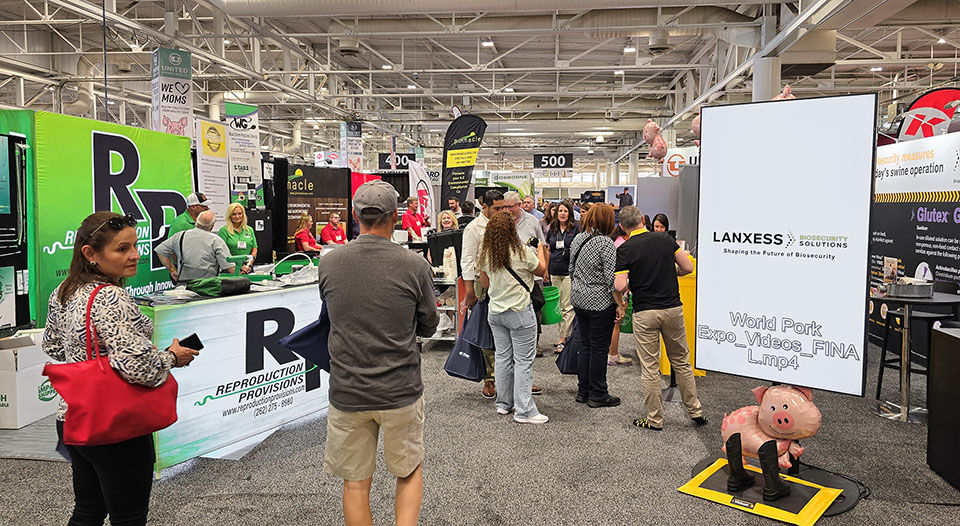
(Photo: Iowa Soybean Association / Jeff Hutton)
Producers process pork issues
June 6, 2024
Like most farmers, Scott Hays has a lot to focus on – input costs, disease concerns and where to market his goods. If he is to remain productive and profitable, all of those issues must be addressed.
And those issues and more were discussed during this week’s World Pork Expo at the Iowa State Fairgrounds in Des Moines. The event, sponsored by the National Pork Producers Council (NPPC), brings together thousands of pork producers, advocates, exhibitors and industry professionals.
Trade expansion
Hays, a fifth-generation pork producer from Monroe City, Mo., is the NPPC’s past president. He says the pork industry currently faces a number of challenges.
“Being a pig farmer has been tough the past 18-24 months,” he says. “But it seems like we’re coming out of that and there is some profitability to be gained.”
Regulatory issues, Prop 12 passage in California, as well as trying to expand global market opportunities have hampered pork producers the last few years, Hays says.
“Things are getting better, but we have to keep demand going and that includes trade,” he says. “I’d love to see more markets, including getting into the African markets, but we need government support.”
NPPC CEO Bryan Humphreys agrees. He says free trade opportunities, as well as other protections, need to be part of a bipartisan farm bill that reflects the needs of pork producers across the country.
The farm bill, Humphreys says, must provide some well-needed assurances for pork producers because the past two years have been so difficult.
“We’re coming out of probably the worst two years in pork production in recent memory,” he says. “We’ve seen a softening of the market and that needs to be addressed.”
Hays and Humphreys agree the past two administrations have not focused enough on agricultural trade.
“There have been too many hurdles for us to expand pork to other parts of the world,” Hays says. “For a long time, this country used to work on free trade agreements, but that has changed. It’s put us in a tough spot and consumers here notice that as well.”
Hays says while bacon, pork loins and ribs are king in the United States, consumer markets in Europe, Asia and Africa are seeking out other affordable cuts of pork that Americans generally don’t favor.
“If Americans want to enjoy bacon and ribs at their current prices, we need to export other cuts of pork around the world,” Hays says. “We need to get those doors open.”
“Those of us in agriculture need to take an aggressive and proactive approach to helping the American consumer understand the benefits of free trade,” says Humphreys. “It not only impacts markets around the world, but it’s helpful to Americans’ pocketbooks.”
Finding workers
Beyond trade, Humphreys and Hays say labor shortages are hurting pork producers.
“In rural America, we are well below the national average for unemployment,” Humphreys says. “Where are we going to attract labor from?”
Hays says he and his fellow pig farmers are always looking for help, but it has been a challenge.
He says the NPPC has been working with the Biden administration to find ways to make the visa process less burdensome so that foreign workers are available to help out on the farm.
“With lower unemployment and fewer young people staying in rural America, we need get these visa workers onboard. We’re hoping for some big changes to the visa process,” Hays says.
Regulation woes
Humphreys says farmers are still navigating the impact of California’s Prop 12 measure.
Prop 12 prohibited California to sell pork from hogs whose mothers (sows) were raised in pens – in Iowa and elsewhere – that do not comply with California’s “highly prescriptive” housing standards. The law applies to all uncooked pork sold in California, whether it was produced there or outside its borders. The law, as written, means much of the pork produced in Iowa and the rest of the United States fails to meet California’s standards.
Humphreys says now that Prop 12 has been implemented, it has resulted in a nearly 41% price increase in certain cuts of pork in California and a 20% decrease in pork consumption there. That, he says, unnecessarily hurts consumers and pork producers across the country.
The NPPC, Humphreys says, is hoping the farm bill addresses those types of regulatory hurdles in the future.
Partnering with soybeans
Be it trade or burdensome regulations, Humphreys says the NPPC looks to the soybean industry as a true partner in making positive changes.
“One of our input costs, of course, is soybean meal,” he says. “With that, we recognize the tremendous opportunity we have to partner with the Iowa Soybean Association and other soybean organizations.
“What looks to be a strong planting year, we recognize there has always been some give and take between pork producers and grain production. We want to save on costs, but we know that if soybean farmers aren’t able to make a profit, there won’t be any feed for our pigs.”
Humphreys says the ISA, as well as other soybean associations, are terrific partners on issues like free trade, research and water quality and they want that to continue.
He says soybean producers have led the way when it comes to advocating for agricultural interests and that pork producers are trying to follow suit.
“The Iowa Soybean Association has been a leader in these areas, and we greatly appreciate it.”
The future looks bright
Humphreys and Hays say pork producers will always face obstacles, but they are optimistic about the future, especially after the past two years.
“We know that around the world, consumers love pork – bacon, pork loins, barbecue – pork is delicious and it’s the No. 1 consumed protein,” says Humphreys. “We just need to maintain regulatory burdens and grow export markets. There are tremendous opportunities out there.”
Hays echoed that sentiment.
“There are brighter days ahead!”
Back